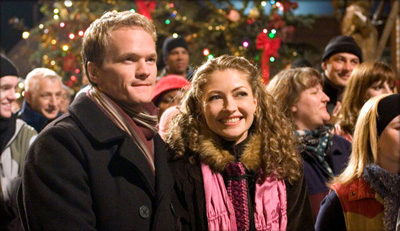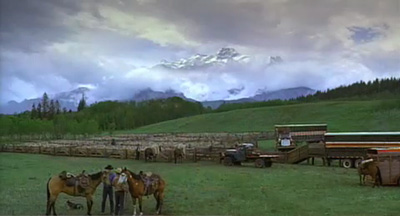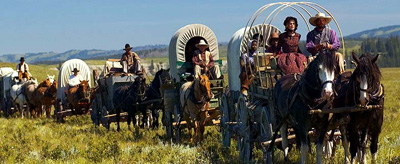While most of the movie [The Assassination of Jesse James] was produced in Alberta, the production's five-day shoot in Winnipeg in late October demonstrated the sheer transformative power a Hollywood movie studio (in this case, Warner Bros.) can wield over a city. Not the least of that impact is the estimated $2.5 million in economic spinoffs for the shoot, including 2,000 nights booked in Winnipeg hotels for out-of-town cast and crew.Those interested in reading about one of Alberta's chief competitors (and collaborators) in the industry may want to check out the entire article.
Streets were shut down. Whole buildings were dressed in frontier finery and sidewalks covered with boards to accurately reflect urban life in Kansas and New York circa 1880. More than 70 permits were acquired from the city to facilitate the shoot, almost double the number required for the 60-day shooting period of Shall We Dance in 2003. While onlookers were relegated to the sidelines, they got to watch this dazzling display, which included glimpses of Pitt himself, nattily attired in a sharply tailored black suit, strolling down Princess Street.
Friday, December 30, 2005
Winnipeg's Film Industry Tops $90M in 2005
The Winnipeg Free Press discusses recent productions have helped that province maintain a successful film industry:
Monday, December 19, 2005
Cardston Native Best Remembered in Kong's Clutches
The Great Falls Tribune features a story on Cardston, Alberta native Fay Wray. Wray co-starred along with one of the "biggest" actor's of all time, King Kong, as Anne Darrow in the 1933 film by Merian Cooper and Ernest B. Schoedsack.
It seems that Wray (who passed away in 2004) was asked to play a cameo role in the new Peter Jackson film, but declined the invitation. More information on Fay Wray at Wikipedia and Northern Stars."As it turns out, the actress was born on the Wray Ranch outside Cardston, a town just north of the Canadian-Montana border in Alberta.
Wray was born in the area, but the family didn't stay in Alberta long, moving to Arizona when Fay was three years old and later California. It was in California that Wray, born Vina Fay Wray, began to get bit parts in the movies as a youngster.
Years later, King Kong emerged as a highly regarded horror film of its time, and Wray was at the top of her career — as well as at the top of the Empire State Building with the star-crossed King Kong."
Sunday, December 18, 2005
The Christmas Blessing

CANOE JAM! Showbiz discusses the holiday special The Christmas Blessing:
Visits from Brad Pitt aside, not a lot of film production takes place in Edmonton, especially compared to the Hollywood North hotbeds of Toronto and Vancouver.He goes on to discuss a possible third film in the series:
But if you're going to shoot a TV movie called The Christmas Blessing, what better place to do it than the winter wonderland that is Canada's northernmost major city?
There's just one catch: They filmed The Christmas Blessing in July. And it wasn't even a heavy mosquito summer in the Alberta capital -- otherwise the filmmakers could have painted the little bloodsuckers white and passed them off as snowflakes. "The networks never seem to order Christmas movies at the right time of year," explained producer Craig Anderson of the TV movie's odd production window.
Whether Gayheart makes it to the final credits of The Christmas Blessing or not, there are already plans afoot to do another sequel, based on author VanLiere's recently released third novel in the series, The Christmas Hope.The Christmas Blessing also stars Neil Patrick Harris (Starship Troopers, Doogie Howser, M.D.) and Rob Lowe (The West Wing) and is a sequel to the 2002 holiday special The Christmas Shoes. The film airs tonight on CBS.
Producer Anderson said he may even return to Edmonton to shoot it -- but this time, "hopefully in winter!"
Photo from the official CBS website of The Christmas Blessing.
Wednesday, December 14, 2005
Golden Day for Alberta Film Industry

Brokeback Mountain © 2005 Focus Features.
Alexandra Burroughs with the Calgary Herald reports on how recent Golden Globe nominations are already a sign of a 'Golden' recognition for Alberta's film industry:
"We [Brokeback Mountain] have twice as many Golden Globes nominations as any other movie -- its exceeding everyone's expectations," says an elated Jordy Randall of Alberta Filmworks, which co-produced the film.Brokeback Mountain wasn't the only Alberta-filmed production nominated. Steven Spielberg's TNT mini-series Into the West is up for awards as well:
"To be associated with a project of this calibre is a fantastic thing for our company and for Alberta as a film community. This is really a celebration of the best Alberta has to offer."
"I'm really proud of Into the West. Its an incredible project -- from the moment I read the script I loved it," says Voice Pictures' Wendy Hill-Tout, who may attend the Jan. 16 Golden Globes ceremony. "It's great for Alberta. This is a quality series that's certainly recognized throughout the world."

Into the West © 2005 Turner Network Television / DreamWorks Television.
Calgary Film Commissioner Beth Thompson commented on the nods:
"This gives Alberta even more credibility as a filming location," says Calgary Film Commissioner Beth Thompson. "You can't be nominated for best picture without amazing locations and the crew to pull it all together."Read the full article at this link. Congratulations to all of the cast and crew involved!
The last time Alberta was involved in such an award-inspiring film was 1992 with Clint Eastwood's Unforgiven, which was nominated for four Globes and won the Oscar for best picture.
"It was right after Unforgiven that Calgary started to see a much bigger workload," says Thompson. "We'll see the same thing with Brokeback. The nomination will bring in bigger audiences than it may have otherwise attracted and its going to have more appeal to people than it may have otherwise. We'll definitely see a benefit from it."
Monday, December 12, 2005
Brokeback Mountain Author Interview
Planet Jackson Hole features an interview with Annie Proulx, author of the book on which Ang Lee's film is based. She discusses the inspiration for the story, equality in Wyoming, and even the filming in Canada:
"I had hoped the film would be shot in Wyoming, and, in fact, Ang Lee and I looked at places in and around the Big Horns. But the decision was not mine to make. The film was shot in Canada because, I was told, Wyoming did not have an infrastructure (read big city Calgary with daily air service and hotels) that could support a film crew. The production designer, Judy Becker, toured Texas (where some of the story is set) and Wyoming, making notes so that the selection of landscape shots in Alberta would match what is on the ground in Texas and Wyoming. Except for a scene in which horses are moving through a forest with deep ground moss, the landscapes very much fit Wyoming. Of course I would like to see more film production brought to Wyoming. I think the state is missing a good opportunity to diversify economically. Some years ago New Mexico, then quite a poor state, decided that they would offer film companies interest-free loans if they would make their films in New Mexico. The offer was attractive and since then many films have been shot in New Mexico. The average film brings millions of dollars into a state, from housing, meals and lodging, extras, transportation, local consulting and so forth. Since then many other states have set up loan situations to attract filmmakers to their locales. It is good that we are seeing more realistic and representative backgrounds in film. I think there are great opportunities here for Wyoming, and not only with film, but with all the arts."Click the link above for the lengthy, but informative interview.
Saturday, December 10, 2005
Brokeback Mountain Links
In a recent ComingSoon.net article, Ang Lee discusses the filmed-in-Alberta feature:
According to Fox News, the film is also sparking a new ratings debate:
"Documentaries helped a lot, still photography, visiting there, reading. But the least is fictional movies. I actually tried to avoid it. I consciously was not doing a Western movie genre, which is overlapped with what I do here, but it has a very cultural influence, which is also very true in our culture. That's more powerful than your knowledge about real people in the West."Follow the link to read more about Lee's approach to the story. The review (9 out of 10) is available here.
According to Fox News, the film is also sparking a new ratings debate:
"We assumed it would be R; it was R. It was totally fair," Schamus [the film's producer] said at a press roundtable discussion about the film. "It's an adult, grown-up movie. It's a movie I think young people could see or should see in the context of their parents talking to them about it. That’s an R rating to me."The New York Daily News has an article on actress Michelle Williams, who plays Alma, a housewife in the film:
But some have blanched at the R as too strict for "Brokeback," since there are only two scenes where the main characters kiss and one short sex scene between them in which more is implied than shown.
"I don't believe it would be inappropriate [as PG-13]," [film critic] Jones said. "The ratings system continues to prove how flawed it is. It's flawed, and it's controlled by larger studios."
"I felt the role in an in-my-bones kind of way," she [Williams] says. "This is the stock I come from."xtra.ca, a gay and lesbian news site, features another interview with Ang:
"Michelle picked up on every beat in the story," says Diana Ossana, who co-wrote the screenplay with Larry McMurtry. "She's from Montana, she has that background; there are things she grasps intuitively. The phrase Still waters run deep completely applies to her."
When asked what made a straight, urbanite from Taiwan latch on to a story of gay cowboys, he laughs. "I think they deal with a lot of twisted elements -- there's no language for them -- very private and twisted. That was something very special for me and yet different from my own experience." But Lee feels the über-masculine genre of the Western has a homo side that's not been depicted, adding, playfully: "Just because you don't go to the other side of moon doesn't mean it doesn't exist."
Friday, December 09, 2005
Air Canada to Offer Direct Edmonton-To-L.A. Flight
According to the Edmonton Journal, Air Canada will offer a direct Edmonton-to-Los Angeles flight, filling the void left by America West's route drop. The move is expected to help Edmonton and Northern Alberta's connection to the movie and telelevsion industry:
Edmonton Economic Development Corp. spokesman Kenn Bur said non-stop Los Angeles connections are important for the Edmonton market, especially our film industry.With this move, Alberta continues to provide excellent transportation facilitation for continued growth in the entertainment production sector.
"It makes our job a lot easier to sell Edmonton to film producers in Los Angeles if they can get a non-stop flight instead of having to take two flights, which makes us seem like a secondary market."
Saturday, December 03, 2005
Tong Taps Beat of DJ Culture
Yuri Wuensch with The Edmonton Sun discusses Michael Dowse's latest film, It's All Gone Pete Tong:
At its start, It's All Gone Pete Tong also seems consumed with its excesses, following the exploits of the fictional Frankie Wilde, the world's most popular DJ, played with feverish and hilarious panache by British actor Paul Kaye.Full article at this link.
Wilde is the king of Ibiza, the Spanish resort island which attracts thousands of revellers to its many clubs every summer. In the film, most are there to see the binge-boozing and coke-snorting party animal that is Wilde. The trouble in paradise comes when Wilde starts going deaf - It's All Gone Pete Tong, named for the famed BBC Radio One host, is Brit slang for when things go wrong.
Ironically, Dowse's previous film is Fubar, a mockumentary giving an inside look at the lives of two Alberta headbangers intent on perfecting their mullets, shotgunning beers and "just givin' 'er." Fubar's heavy metal seems miles apart from Ibiza's beats, but Dowse's admitted ignorance of dance music is part of what makes his take on it so successful. His eye as the outsider sees things sometimes drug-addled dance fans might not, or simply may not want to admit to.
Like Fubar, Tong is a redemptive tale. Although Wilde starts the film off as a jerk, albeit a fairly likable one, confronting his deafness ultimately makes him recognize what's truly valuable in life. It's a poignant journey with a lot of heart and plenty of laughs.
It's All Gone Pete Tong is also a beautiful-looking film thanks to the striking cinematography of Balazs Bolygo, who captures the Mediterranean sun and eye-popping club sequences - probably the best ever filmed - with equal aplomb. Offbeat musical selections that aren't solely electronic-based also lend Tong more texture in what's probably the most definitive (perhaps unintentionally so) film about DJ culture released to date.
Subscribe to:
Comments (Atom)